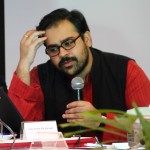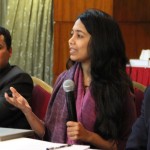Cyber security, surveillance and the right to privacy: Country perspectives – #SAFoE
by Richa Kaul Padte
This blog post is fourth in a series of ten blog posts to report on the 'Third South Asian Meeting on the Internet and Freedom of Expression' recently concluded in Dhaka, Bangladesh.
The best way to protect people’s rights is to enable people to protect their rights themselves – Chinmayi Arun
Opening the session on cyber security, surveillance and privacy, moderator Pranesh Prakash from the Centre for Internet and Society (India) frames the debate by talking about how the principles raised by discussions on security, privacy and surveillance are always in tension with each other. ‘The boundaries that have been drawn in a pre-digital era don’t apply online always [and] the classic model of state-controlled surveillance is not as relevant [today].’
Taking forward the discussion by setting both a global and national framework around the issue, Assistant Professor at the Delhi-based National Law University Chinmayi Arun brings to light the ways in which cyber security is consistently tabled on several global agendas; however, with little to no meaningful parallel discussions around the right to privacy. She also connects the idea of surveillance to notions of censorship vis a vis freedom of expression, and poignantly states: ‘surveillance is a lot more insidious than censorship – [so much] more can take place before people realise it is happening.’ Prakash furthers this idea in his transition between country perspectives by highlighting the ways in which surveillance measures are already established and heavily pervasive, with both Prakash and Arun advocating greater transparency in areas where these measures are in place. As Arun says, ‘it’s not true that every instance of surveillance needs to be secret until it’s done’, and distinguishing between necessary surveillance measures (in the case of crime investigations, for example) and those that position all people as criminals who must be monitored, is key to taking the discussion forward.
Mohammad Nazmuzzaman Bhuian, an Associate Professor from the University of Dhaka, opens a Bangladeshi country perspective with the question, ‘how does a cyber security act become a surveillance act?’ A cyber crime refers to any crime that involves a computer or a network, and the crimes under this can play out in two ways. The computer itself may be a target, or it may be used to carry out a crime. It is when it is used to carry out a crime that the question of online surveillance arises.
Offering another perspective from Bangladesh, Head of the Centre for IT Security and Privacy and Assistant Professor, University of Asia Pacific, Mohammad Shahriar Rahman, discusses the manipulation of security and surveillance laws by the State in order to create greater security for itself. He cites the ban of YouTube in the country in response to a US-produced video ridiculing the Prophet Mohammed and the attacks on bloggers who have advocated for free speech on the Internet, including speech that may be anti-authoritarian or anti-religious. These examples echo Mariyath Mohamed’s perspectives on the interplay between religion, politics and censorship from the previous session, which clearly resound through many South Asian countries.
Perspectives from Nepal, offered by speaker Kailash Prasad Neupane from the Nepal Telecommunications Authority, highlight the acute similarities between the laws in different South Asian countries, which all position the freedom of expression as ‘subject to certain restrictions’, where the subjectivity of the clause tends to be interpreted by a powerful and majority State against its minority citizens, thus undermining both democracy and citizens’ rights. As Rahman says, ‘if the government wants to be seen as democratic in these times, they need to realise you can’t jail everyone who is critical of the Prime Minister.’
Speaking from the floor, Bishakha Datta, from Mumbai-based women’s media organisation Point of View, expands on the speakers’ views by highlighting the ways in which, given the extensive measures of State security and surveillance, societies themselves become structured around a culture of surveillance that citizens in turn internalise and see as a necessary part of their lives. She asks, ‘when we talk about the right to privacy, are we saying that we are willing to accept surveillance as long as our privacy is maintained, or are we opposing it on the grounds of privacy?’
Echoing Prakash’s idea that ‘the way in which security and privacy are portrayed as being at loggerheads is false’, Arun responds to Datta by advocating privacy as the starting point for all discussions surrounding security. In summary she states, ‘we must underline our right to privacy,and that right must always dominate. One must always start with that right, and then narrow the circumstances in which, only when it is absolutely necessary and to the extent absolutely necessary, it may be violated.’ And it is through this consistent demand for the right to privacy, and the placing of citizens and individuals (rather than the interests of the State) at the heart of these conversations, that we can see security and privacy as co-existing notions that work to ensure, rather than suppress, freedom of expression.

